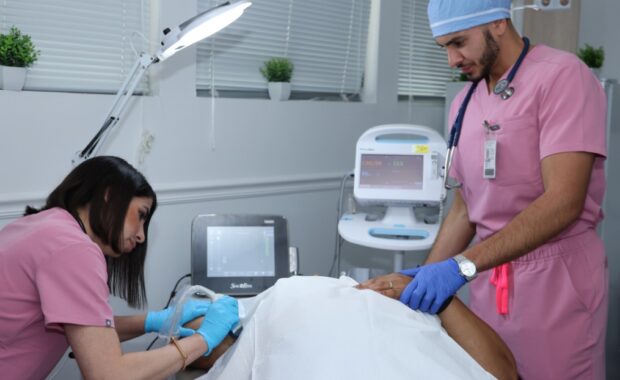How PAs with High PQ Enhance Patient Care
Interpersonal Intelligence Helps with Healthcare Teams and Patients
November 18, 2019
Every PA knows continuing to develop your people skills is critical to having the kind of influence you want to have on your patients and care team members. You need a high interpersonal intelligence quotient, or PQ. According to Vanessa Van Edwards, author of the national bestseller Captivate and leading authority on developing this form of interpersonal intelligence, PQ “is a measure of how well you can read, understand, and communicate with others.”
Average PQ allows you to provide insight, understanding, and an emotional equilibrium that’s extremely valuable in today’s healthcare environment. And if you’re thinking, “Hey, I’m a PA, I’ve got pretty good people skills,” what you might not know is that people who go from average to high PQ:
- Make on average $29,000 more per year
- Are 90% of all top business performers
- Report being 42% happier and more fulfilled in their lives
- Are considered more trustworthy, organized, and influential
Statistics from the Science of People lab PQ study, 2018.
So, what’s high PQ?
High PQ has three components:
- Being able to recognize and understand your own emotions and those of others
- Being able to manage your own emotions
- Being able to handle and inspire emotions in others
These qualities are especially important in managing the emotions of patients and their families during difficult interactions. And they’re equally important in today’s team-based healthcare model, where PAs are often among the most highly skilled people-people on the team.
High PQ when working with patients
A PA’s primary responsibilities include explaining complex situations and educating patients, all while managing their own emotions and the emotions of the patient/family. This has a strong influence on the patient’s overall experience.
Robert Concini, PA-C, in vascular surgery who is currently working a locum tenens job in Binghamton, NY, sees his ability to connect emotionally and show compassion as a key to improving patient care.
“I’m not just there to educate patients,” Concini says. “I’m also able to absorb the pain and difficulties of the patients’ situations and show them true compassion, which eases their stress.”
He has learned that it’s OK to express his own emotions as well. “When I was younger and working in emergency care, I cried a lot when we lost a patient. A senior surgeon told me, ‘Hey, that’s ok, it’s who you are. I’ll start worrying about you when you don’t care that we lost a patient.’ I feel for my patients. I have compassion for them and it makes me good at what I do. That said, I keep my own emotions under control while in the OR. A skilled PA needs to do both.”
Justin Corbit, PA-C, in cardiovascular and thoracic surgery at a Wisconsin practice, recommends easy PQ adjustments that make patients feel like you’re spending focused time with them, regardless of how many minutes you’re actually in the room.
“When I enter a patient’s room, I make it a point to pull up a chair and sit down,” Corbit says. “It’s very easy to just stand in the doorway with a hand on the knob, but this sends the patient the message that I’m just dropping by on my way to someone and somewhere else. I give them my full attention and don’t let the nurses interrupt them while they’re talking to give me new information. They end up feeling that I have spent a lot more time in the room with them than I actually have, which improves their care and helps me manage my time.”
PQ tips from the pros
Here are additional high PQ tips from highly skilled PAs:
- Use the patient’s name when speaking to them.
- Learn to read micro expressions to spot hidden emotions.
- Raise your eyebrows to indicate interest in what the patient is telling you or to let your patient know you’re about to say something important and they need to pay attention.
- Read your patient’s non-verbal cues (such as crossing arms and legs, looking down, or looking away), which indicate how comfortable the patient is with what’s being shared.
- When a patient shows signs of being uncomfortable, help them handle difficult emotions by using your own breathing and eye contact to help them regulate their emotions.
High PQ when working with the team
Individuals on a team who can understand each other’s emotions (and who can manage their own) relate and function better as a team. PAs are skilled people-people. Their ability to read the non-verbal cues, body language, and micro expressions of their patients position them to be key PQ influencers for the entire care team. When PAs with high PQs support the care team’s ability to relate and interact with each other as people, they can enhance productivity and energize the experience for everyone.
Concini sums up what makes high team PQ in three words. “You need to be affable, available, and adaptable. When I come in as a locums PA, I am often the newest member of the team and have to pay special attention to the mental states of others. I know that different doctors have strong preferences for how they perform procedures, and my ability to be aware of that and adapt my behavior accordingly has always served me well as a PA. It allows me to truly become an extension of my doctor by adapting to how he prefers to perform the surgery.”
Once a PA knows how the team prefers to operate, Concini suggests that two additional high PQ qualities come into play: anticipation and organization. “I’m not the one deciding whether or not to do a particular surgery. What I am doing is anticipating what will be needed should the doctor decide to move forward with the surgery. I’ve got the OR on hold. I know the patient’s history and current medication and any potential comorbidities, and I help coordinate the flow of others’ activities so that everything and everyone is ready and available if needed.”
The author, Van Edwards, weighed in on how vital PQ is to PAs specifically, and to a healthcare team as a whole. “People skills are THE most essential job skill for successful PAs. When you have high interpersonal intelligence it makes the entire team’s job easier. Everything gets done faster because you communicate better, work with others more easily, and can bring out the best in your team members. PAs are key communicators between patients, family members, and healthcare team members, so high PQ is one of the most important job skills a PA can have.”
Wondering how high your PQ is? Take a free PQ quiz here.
This article first appeared on CompHealth.com.
Thank you for reading AAPA’s News Central
You have 2 articles left this month. Create a free account to read more stories, or become a member for more access to exclusive benefits! Already have an account? Log in.



